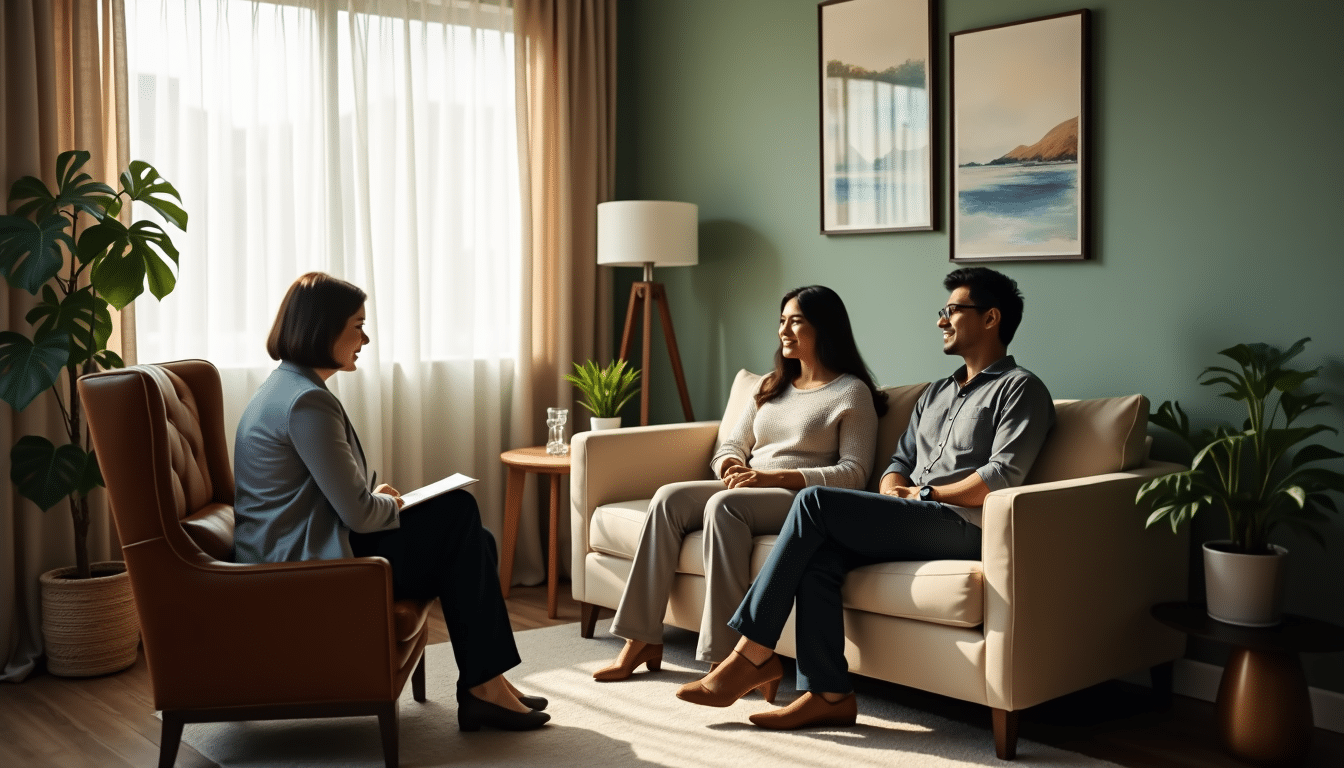Calgary Marriage Counselling and Therapy: Empowering Spouses and Healing Marriages

At our Calgary Psychologist Clinic, we understand that marriage is a journey filled with ups and downs, and sometimes, a little extra support is needed along the way. That’s where marriage counselling comes in. Our dedicated team of therapists specializes in marriage counselling and couples counselling, providing you and your partner with the tools and support you need to strengthen your bond and navigate life’s challenges together.
Unlock the Potential of Your Relationship
Marriage counselling is a form of therapy designed to assist marriages and relationships in overcoming challenges and improving overall satisfaction. It’s a collaborative process that involves the participation of both partners in a safe, non-judgmental environment. Whether you’re facing communication breakdowns, conflicts, or other issues, marriage counselling can help you identify underlying issues, foster a deeper understanding of each other, and cultivate a more fulfilling partnership.
Calgary Therapists That Provide Marriage Counselling and Therapy
Andrea Krygier
Registered Psychologist
English, Spanish
Dr. Raheleh Tarani
Registered Provisional Psychologist
English, Farsi, Japanese (basic), Hindi, Turkish, Punjabi, Urdu
Murray Molohon
Registered Psychologist
English
Jarret Verwimp
Clinical Canadian Certified Counsellor
English, French, Spanish (basic)
Nav Gill
Registered Provisional Psychologist / Clinical Counsellor
English, Punjabi
Enhancing Communication and Connection
One of the primary goals of marriage counselling is to enhance communication between partners. Our therapists work with you and your partner to develop healthier ways of expressing your thoughts, feelings, and needs, fostering open and honest dialogue. By improving communication skills, couples can address conflicts more effectively, reduce misunderstandings, and build a stronger foundation of trust and intimacy. Our counsellors and psychologists are trained in a variety of frameworks that have been shows to be beneficial for marriage counselling such as Gottman method and emotionally focused therapy.
Navigating Challenges with Confidence
Life is full of challenges, and navigating them together as a couple can be daunting. Marriage counselling provides you with the support and guidance you need to tackle these challenges and life transitions head-on. Whether you’re facing financial stress, parenting issues, or struggles with intimacy, our therapists will help you develop practical strategies and coping mechanisms to overcome obstacles and strengthen your relationship.
Reigniting the Spark
Over time, the spark that initially brought you together may dim, but it’s never too late to reignite the passion and connection in your marriage. Marriage counselling offers you and your partner the opportunity to rediscover what drew you to each other in the first place and reignite the flame of love and intimacy. Through guided exercises, exploration, and reflection, you’ll learn how to nurture and sustain a fulfilling and vibrant partnership.
Take the First Step Towards a Happier, Healthier Marriage
Ready to invest in the health and happiness of your marriage? We’re here to help. Contact us today to schedule your free consultation with one of our marriage and couples counsellors and take the first step towards a stronger, more resilient relationship. At Best Choice Counselling & Assessments, we’re committed to helping you and your partner thrive in love and partnership.
Marriage Counseling: When Couples Should Start and Why It Matters

Nearly 50% of marriages in the United States end in divorce, and only 19% of struggling couples ask for professional help before separation. Marriage counseling gives couples a clear path to tackle relationship issues before they become too difficult to solve.
Research shows that couples who start counseling early have better chances of saving their relationship. The numbers speak for themselves – 70% of couples who complete marriage counseling see better relationship satisfaction and communication skills.
Professional counseling equips couples with proven tools to resolve conflicts and build stronger emotional connections. This piece delves into the rise of marriage counseling and helps couples understand when to seek help. It also explores the science behind successful therapy and shares practical ways to get the most out of counseling sessions.
Understanding the Evolution of Marriage Counseling
Marriage counseling has transformed remarkably since its original roots in Germany during the 1920s [1]. Religious and family support systems provided informal counseling that evolved into a professional therapeutic discipline.
The trip from informal counseling to professional therapy picked up speed in the 1950s as therapists started treating psychological problems within families [1]. The reduced stigma led to a radical alteration, and about 50% of married couples now ask for counseling during their relationship [2].
Modern marriage counseling includes these therapeutic methods:
- Cognitive-behavioral couple therapy
- Integrative behavioral couple therapy
- Emotionally focused therapy (EFT)
Technology has made counseling services available to more people. Digital platforms help couples connect with therapists remotely and offer flexible scheduling options through multiple communication channels [3]. Couples with busy schedules or location constraints can now access these services easily.
Professional marriage counseling works exceptionally well. Studies show that 70-90% of couples find therapy beneficial [4], and 90% of couples who complete therapy report improved emotional well-being [4]. Physical well-being improves for about two-thirds of participants [4].
Commitment and timing determine counseling’s success. Counselors recommend 12 sessions on average, and 65.6% of cases reach completion within 20 sessions [4]. EFT stands out with exceptional results – 70-75% of couples no longer feel relationship distress after treatment [5].
Identifying the Right Time for Counseling
Studies show that couples usually wait an average of six years after serious problems emerge before getting professional help [6]. Experts recommend trying marriage counseling as a preventive step instead of waiting for a crisis.
Early warning signs and preventive measures
These early signs suggest couples might need counseling:
- Constant criticism or contempt
- Breakdown in healthy communication
- Emotional or physical distance
- Trust issues or commitment concerns
- Declining intimacy or connection [7]
Many couples put off getting help early. However, 70% of couples who try preventive therapy see better relationship satisfaction [8].
Life transitions and relationship stressors
Relationship strain often stems from major life changes. Becoming parents, switching careers, moving to a new place, or health challenges can all impact relationships significantly [9]. Couples should think about counseling to handle these periods better.
Common misconceptions about timing
Many people believe marriage counseling only helps relationships that are about to end [10]. Research proves otherwise. Couples who get counseling earlier have a 50% lower likelihood of divorce [9]. Experts stress that counseling helps at any relationship stage, not just during rough patches.
90% of couples who finish therapy report better emotional well-being [11]. This shows why getting help matters. Couples who start counseling before their problems get serious see much better results [6].
The Science Behind Successful Counseling
Recent scientific research shows how marriage counseling affects psychological health and brain function. Studies show that couples therapy helps 70% of couples, and 80% of participants report better conditions after they complete their treatment [12].
Neurological and psychological benefits
Relationship therapy works through several brain pathways. Research shows that when couples express gratitude during therapy sessions, their bodies produce more oxytocin. This helps lower stress levels and creates a calming effect [12]. Eye contact exercises between partners create what scientists call “self-other merging” and build stronger emotional connections [12].
Evidence-based therapeutic approaches
Today’s marriage counseling uses several tested methods:
- Emotionally Focused Therapy (EFT) – Shows 75% effectiveness in reducing relationship distress [13]
- The Gottman Method – Built on 40+ years of relationship research [12]
- Solution-Focused Therapy – Created to solve specific relationship problems [12]
Measuring relationship improvement metrics
Therapists use standard tools to measure how well marriage counseling works. The Dyadic Adjustment Scale helps track progress and relationship satisfaction [13]. Couples who get regular feedback during their therapy sessions are twice as likely to see positive changes compared to those who don’t [14].
The bond between counselors and couples is a vital part of successful treatment. Research shows this professional connection, combined with proven methods, guides couples toward better outcomes in 70-80% of cases [15].
Maximizing Counseling Benefits
Marriage counseling works best when couples prepare well and apply therapeutic techniques consistently. Couples who get involved in counseling report 90% higher satisfaction rates with their relationship outcomes [16].
Preparation and commitment factors
Good counseling starts with proper preparation. Successful couples show these key elements:
- Clear, achievable therapy goals
- Regular attendance and participation
- Open communication with the therapist
- Dedication to making suggested changes
- Readiness to try new skills
Research shows couples who create structured routines to integrate therapy have 70% better outcomes in their relationships [17].
Integration with daily relationship practices
Couples see benefits when they make therapeutic techniques part of their daily lives. Partners who practice mindfulness exercises and stick to regular communication schedules handle emotions better [18]. Couples who set aside specific time for relationship-building activities also report stronger connections and better understanding.
Long-term maintenance strategies
Successful couples develop systematic ways to build on their progress. Relationships improve with regular “check-in” sessions where partners track their progress and talk about concerns [19]. A consistent routine with these elements helps:
Couples should have weekly communication sessions. Without doubt, partners who keep regular dialog going show 65% higher relationship satisfaction [20]. Partners should create a maintenance plan that has periodic professional check-ins after formal counseling ends [21].
Couples who keep using therapeutic techniques after counseling report 80% higher success rates in keeping their relationship improvements [22]. Partners who coordinate their care in all aspects of well-being, including medication management when needed, show better long-term results [16].
Conclusion
Research and documented success rates show marriage counseling helps couples improve their relationships. Couples who complete professional therapy report better relationship satisfaction. They also see improvements in how they communicate and handle emotions.
Modern therapeutic approaches work best at the time couples ask for help early. The numbers tell a compelling story – 70-90% of couples benefit from therapy. Couples that involve themselves in preventive counseling are 50% less likely to get divorced. These facts highlight why professional help matters before relationship issues become too difficult to handle.
Both partners must participate actively and stay dedicated to make counseling work. Better results come to couples who set clear goals and show up regularly. They also practice what they learn each day. Partners who follow well-laid-out routines see 70% better results in their relationships.
A stronger relationship needs ongoing work beyond counseling sessions. Couples achieve lasting improvements through weekly talks and regular professional check-ins. The success rate jumps 80% higher for those who keep up with these practices. Partners can build lasting relationships that endure with professional guidance and dedicated effort.
FAQs
Q1. When is the right time for couples to seek marriage counseling?
Couples should consider marriage counseling when they notice early warning signs such as constant criticism, communication breakdown, emotional distance, or declining intimacy. It’s beneficial to seek help early, as preventive therapy can significantly improve relationship satisfaction and reduce the likelihood of divorce.
Q2. How effective is marriage counseling in saving relationships?
Research shows that 70-90% of couples find marriage counseling beneficial. About 70% of couples who complete therapy report improved relationship satisfaction and communication skills. Additionally, couples who engage in counseling have a 50% lower likelihood of divorce compared to those who don’t seek help.
Q3. What are some common misconceptions about marriage counseling?
A prevalent myth is that counseling is only for relationships on the verge of collapse. In reality, counseling can be beneficial at any stage of a relationship, not just during crises. Early intervention through counseling significantly increases the chances of relationship success.
Q4. How long does marriage counseling typically last?
Most counselors recommend an average of 12 sessions, with about 65.6% of cases reaching completion within 20 sessions. However, the duration can vary depending on the couple’s specific needs and the issues being addressed.
Q5. How can couples maximize the benefits of marriage counseling?
To maximize benefits, couples should set clear objectives, attend sessions regularly, communicate honestly with the therapist, and commit to implementing suggested changes. Integrating therapeutic techniques into daily life, such as practicing mindfulness exercises and maintaining regular communication schedules, can lead to better outcomes. Couples who continue applying these techniques after formal counseling report 80% higher success rates in maintaining relationship improvements.
References
[1] – https://en.wikipedia.org/wiki/Couples_therapy
[2] – https://mydenvertherapy.com/couples-therapy-statistics/
[3] – https://manochikitsa.com/the-role-of-technology-in-marriage-counseling/
[4] – https://www.wellmarriagecenter.com/what-percentage-of-marriages-survive-after-counseling/
[5] – https://www.psychologytoday.com/us/blog/mindful-relationships/202101/the-most-effective-couples-therapy-by-far
[6] – https://www.gottman.com/blog/when-is-it-a-good-time-to-seek-counseling/
[7] – https://therapybychoice.com/5-warning-signs-its-time-to-try-couples-counseling/
[8] – https://www.talkspace.com/blog/signs-you-need-to-go-to-couples-therapy/
[9] – https://kptherapy.com/relationship-problems-consider-counseling/
[10] – https://hopecounselingeap.com/common-misconceptions-about-marriage-counseling/
[11] – https://www.gottman.com/blog/is-it-time-to-go-to-couples-counseling/
[12] – https://www.healthline.com/health/mental-health/therapy-for-couples
[13] – https://www.psychologytoday.com/us/blog/in-it-together/201712/couples-therapy-does-it-really-work
[14] – https://www.apa.org/monitor/2019/11/ce-corner-relationships
[15] – https://pmc.ncbi.nlm.nih.gov/articles/PMC9645475/
[16] – https://www.primalpoint.org/elevate-your-life-how-integrating-therapy-into-your-daily-routine-can-transform-your-well-being-in-parkville-md
[17] – https://dbtofsouthjersey.com/integrating-therapy-into-your-daily-routine-for-success/
[18] – https://abhwaz.com/integrating-therapy-into-your-daily-routine-for-success/
[19] – https://www.nathancobb.com/preventing-relapse-in-couples-therapy.html
[20] – https://www.marriage.com/advice/relationship/relationship-maintenance-101/
[21] – https://www.marriagefriendlytherapists.com/blog/7-strategies-for-maximizing-the-benefits-of-marriage-counseling-287
[22] – https://aspirecounselingal.com/maintain-the-progress-expert-tips-for-after-couples-therapy/
Calgary Therapy Mental Health Issues
In our Calgary counselling clinic, we help with many mental health problems. Our therapists can assist with a range of issues. These include grief, trauma, anxiety, depression, parenting challenges, PTSD, eating disorders, postpartum depression, fears and phobias, ADHD, self-esteem issues, relationship difficulties, OCD and many more.
No matter what you’re dealing with, our therapists are here to provide evidence-based therapy that fits your needs. We want to help you overcome challenges, build resilience, and find more happiness and fulfillment in your life.




















Calgary Counselling And Psychologist Services
Our Calgary Psychologists and therapists offer counselling and formal psychological assessment services for individuals, couples, and families. We tailor these services to meet the unique needs of each client. Our goal is to support our clients in achieving their personal and relational goals.
We help families improve communication and solve problems. We also offer assessments for learning disabilities and ADHD. Our support extends to various mental health issues. Our support covers many mental health issues.
Our therapists dedicate themselves to providing a safe and supportive environment for clients of all ages and backgrounds. They help clients explore their thoughts, feelings, and experiences. The team is committed to creating a space where clients can feel comfortable and understood. They strive to help clients on their journey towards healing and growth.
We are here to help with individual therapy, couples counseling, or support for your child, teen or family. We offer counseling services in person and virtually. This makes it convenient and flexible for our clients to access our services. Whatever challenges you may be facing, we are committed to guiding you towards healing, growth, and greater well-being.































